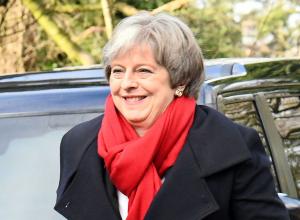
By David Young, Press Association
The Prime Minister and Taoiseach are holding crunch talks at Stormont amid growing speculation that a deal to restore powersharing is edging closer.
Theresa May and Leo Varadkar are spending the afternoon in Belfast in a joint push to help end the 13-month political stalemate.
The leaders arrived at Stormont House before lunch, ahead of a bilateral meeting to discuss the impasse.
They are then due to hold discussions with the region's political leaders in a bid to encourage Sinn Fein and the Democratic Unionists (DUP) to resolve their differences.
Prime Minister Theresa May arrives at Stormont House to meet Tainiste Simon Coveney and the political parties. Nothing to say on arrival but a warm welcome from Secretary of State Karen Bradley. pic.twitter.com/7XrjdcRw70
— Q Radio News (@qnewsdesk) February 12, 2018
While both parties have acknowledged that progress had been made, a DUP source has played down expectations of a deal being finalised on Monday, suggesting to the Press Association that if an agreement does materialise it is more likely later in the week.
In a clear sign that the dynamic at Stormont has shifted gears, the Taoiseach has cancelled a scheduled meeting with Welsh First Minister Carwyn Jones in Dublin on Monday in order to head to Belfast.
Downing Street said Mrs May will tell the parties that her Government is ready to introduce legislation to enable the re-establishment of a devolved Executive as soon as possible, if an agreement is struck.
Ahead of the meetings at Stormont, the Prime Minister met aircraft workers at Bombardier's Belfast factory in the wake of the company's trade battle victory in the United States.
The Prime Minister has met workers at Bombardier's Belfast factory in the wake of the company's trade battle victory in the US. https://t.co/8IV43wED2K
— Q Radio News (@qnewsdesk) February 12, 2018
Mrs May toured the plant floor where the wings of the Canadian manufacturer's C Series jets are built.
Bombardier's bitter trade dispute with Boeing had threatened jobs at the Belfast plant, but there was relief at the plant last month when a proposed 292% tariff on the US import of the jets was overturned by the US International Trade Commission (ITC) in Washington DC.
The Prime Minister directly lobbied President Donald Trump on a number of occasions during the trade row.
Northern Ireland has been without a functioning government since January 2017 and several rounds of talks to resolve the crisis have failed.
However, speculation has been growing that a deal between Sinn Fein and the DUP is imminent.
On Saturday, Sinn Fein's Stormont leader Michelle O'Neill said talks are likely to draw to a close this week.
The DUP/Sinn Fein-led coalition imploded last January amid a row over a botched green energy scheme.
That rift subsequently widened to take in long-running disputes over culture, social issues and legacy.
The main sticking point preventing the restoration of an executive is the Irish language.
Sinn Fein wants a standalone piece of legislation to protect speakers - an Irish Language Act - but the DUP has long insisted it would only countenance new laws if they also incorporate other cultures, such as Ulster Scots.
There was speculation over the weekend that three pieces of legislation - an Irish Language Act, an Ulster Scots Act and a broader Culture Act - could be a means to satisfy both sides.
SDLP leader Colum Eastwood has warned that any deal to restore powersharing must end the cycle of political stand-off between Sinn Fein and the DUP.
He said it is not enough to simply form a new executive.
"The real change necessary is an end to the cycle of two parties who have proved themselves very good at the art of political stand-off, but very bad at the responsibility of government," he said.
"That is the joint DUP/Sinn Fein status quo that must now end."


 Education Authority boss hits out at criticisms of public services
Education Authority boss hits out at criticisms of public services
 Man in 90s dies following Co Down road crash
Man in 90s dies following Co Down road crash
 Police to increase patrols after second incident of shots being fired in Belfast
Police to increase patrols after second incident of shots being fired in Belfast
 Woman charged over theft of campaigner’s car ‘must stay out of Belfast’
Woman charged over theft of campaigner’s car ‘must stay out of Belfast’
 Bluetongue restrictions in Northern Ireland will be relaxed from Friday
Bluetongue restrictions in Northern Ireland will be relaxed from Friday